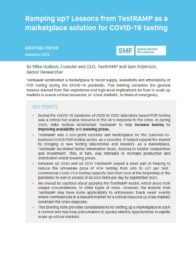TestRAMP established a marketplace to boost supply, availability and affordability of PCR testing during the COVID-19 pandemic. This briefing considers the general lessons learned from that experience and high-level implications for how to scale up markets in scarce critical resources, or ‘crisis markets’, in times of emergency.
KEY POINTS
- During the COVID-19 pandemic of 2020 to 2022 laboratory-based PCR testing was a critical but scarce resource in the UK’s response to the crisis. In Spring 2020, Mike Hudson established TestRAMP to help increase testing by improving availability and lowering prices.
- TestRAMP was a non-profit recruiter and marketplace for the business-to-business COVID PCR testing sector. As a recruiter, it helped expand the market by bringing in new testing laboratories and resellers. As a marketplace, TestRAMP facilitated better information flows, helping to bolster competition and investment. This, in turn, was intended to increase production and distribution whilst lowering prices.
- Between Q2 2020 and Q4 2021 TestRAMP played a small part in helping to reduce the wholesale price of PCR testing from £65 to £21 per test. Commercial COVID PCR testing capacity rose from zero at the beginning of the pandemic to well in excess of 90,000 tests per day by September 2021.
- We should be cautious about applying the TestRAMP model, which arose from unique circumstances, to other types of crisis. However, the lessons from TestRAMP may have some applicability to unforeseen ‘black swan’ events where inefficiencies in a nascent market for a critical resource (a crisis market) constrain the crisis response.
- This briefing note provides considerations for setting up a marketplace in such a context and may help policymakers to quickly identify opportunities to rapidly scale up critical markets. A longer version will be available at mikehudsonfoundation.org
You can find out more on MHF’s website (mikehudsonfoundation.org) and Mike’s LinkedIn page

DOWNLOAD THE BRIEFING: PDF
